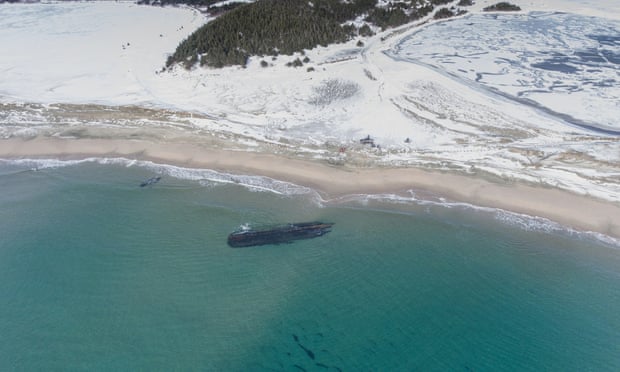
The coastal community of Cape Ray in Newfoundland is abuzz with intrigue and excitement as a centuries-old shipwreck has suddenly and inexplicably appeared on the sandy shores nearby.
Gordon Blackmore, a local resident, made the unexpected discovery while hunting seabirds on Cape Ray's sandy shores. A dark shadow under the turbid waters caught his eye, a feature that had not been present just a few days prior. Excitedly, he rushed home to share the news, prompting his mother to join him on the beach. "It's amazing, there is no other word for it," she exclaimed.
Cape Ray, with a population of 350 on the southwest coast of Newfoundland, has a shared history with an island known as "the Rock," serving as the final resting place for at least eight ships that succumbed to hostile weather, poor navigation, or sheer misfortune. What sets this recent discovery apart is the unexplained nature of the wreck's sudden appearance.
Neil Burgess, president of the Shipwreck Preservation Society of Newfoundland and Labrador, speculates that a combination of coastal erosion and the force of post-tropical storm Fiona, which wreaked havoc in the region last year, may have freed the ship. Large ocean swells last week could have nudged the wreck towards the shore.
Photographs circulating on social media provide some clues about the ship's origins, with wooden dowels and copper pegs suggesting a construction common in the 1800s. The size, estimated at least 24 meters, indicates a vessel larger than a schooner.
The provincial government has dispatched a team to assess and potentially preserve the remains of the ship. However, the same unpredictable tides and weather that have shaped the fate of ships for centuries will dictate when experts can visit the site.
Local residents are concerned that strong waves might pull the wreck back into the depths. Officials have warned against tampering with the site, while some residents note that nature itself could damage the wreck faster than residents seeking souvenirs.
The community's Facebook page has become a hub for speculation and research into the ship's possible origins, with residents delving into old records and family knowledge of fatal voyages. This discovery serves as a poignant reminder of the delicate relationship coastal communities have with the ocean, prompting a call to uncover the history and preserve the memory of this newly revealed part of their maritime heritage.
